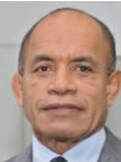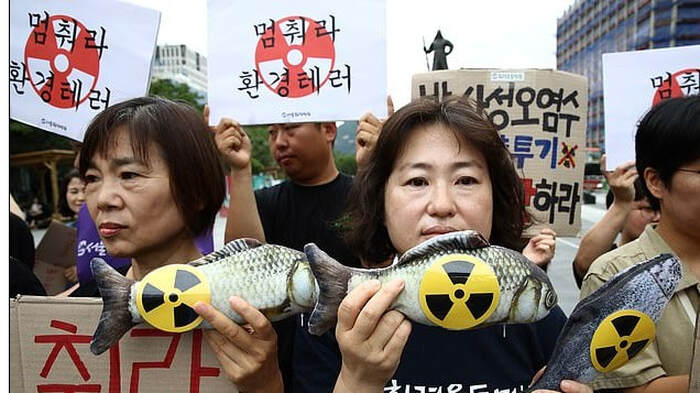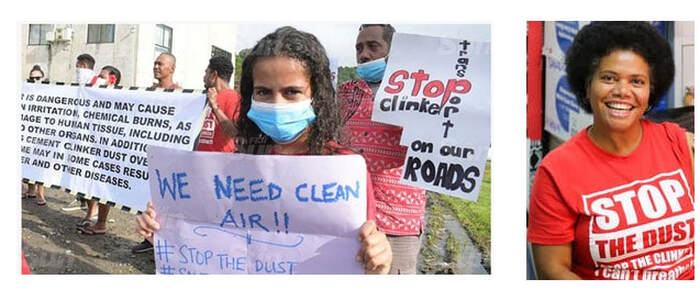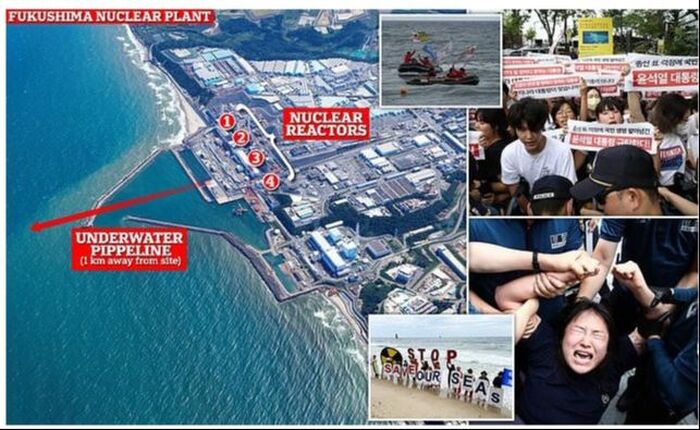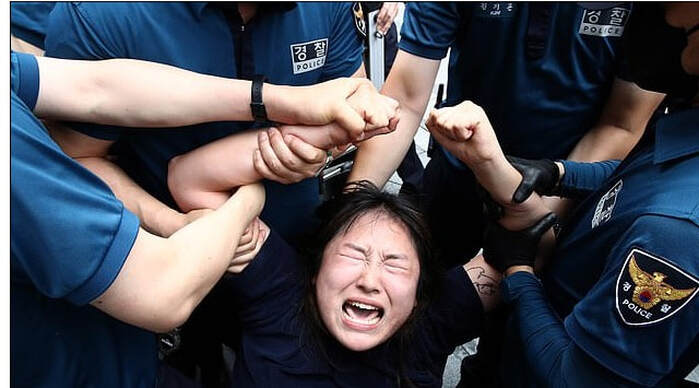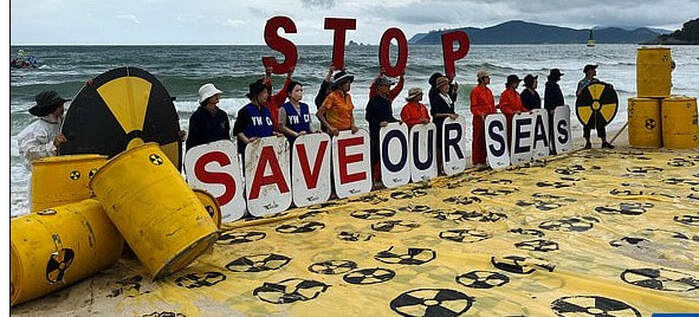PACIFIC OCEAN IS NOT RABUKA and Japan's TRASH BIN
'I am worried about the future. We can’t pass on the responsibility of what happened during our generation to the generation of our children and to future generations.'
Japanese protester Ruiko Muto, 70, outside the Fukushima power plant.
Fijileaks: Dr Lesikimacuata Korovavala, the PSC appointed Permanent Secretary for Foreign Affairs, is once again the man behind Sitiveni Rabuka's outrageous and unforgiveable decision to allow the dumping of Japan's nuclear waste in surrounding Fiji and Pacific Island waters. Korovavala was the main culprit who had pushed the late Prime Minister Laisenia Qarase to the wire, resulting in the overthrow of the Qarase government in 2006. Korovavala had arm-twisted Fiji to sign to the UN Refugee Convention. After the coup, he fled to Australia, where he was hiding from us for years. | In March, he re-surfaced as PS, Foreign Affairs, to Rabuka |

FLP: One Man's Dictates, Beating all into submission to accept his sole decision over Fukushima waste water dump
Prime Minister Rabuka’s personal views on the dumping of Fukushima nuclear waste water in the Pacific Ocean should be subordinate to public interest and the demands of the Pacific people, says Labour Leader Mahendra Chaudhry.
It seems the matter was not discussed at Cabinet level for a collective decision. He is also defying a parliamentary decision denouncing the dumping. Should the nation bow to the dictates of one man?
Why doesn’t Mr Rabuka insist that Japan dump its nuclear waste in its own lakes as has been proposed by Tuvalu’s Minister for Finance, Seve Paeniu?
The PM should also show solidarity with The Pacific Island Forum (PIF) whose general consensus is that of concern for the marine life and food sources that Pacific Island nations so heavily rely on.
In March 2011, an earthquake caused damage at the Fukushima Nuclear Power Plant in Japan. Water was used to cool the reactors and this water, now contaminated, was stored after the event. Fukushima has since been decommissioned and in early 2021, the Japanese government decided to dump the stored water into the Pacific Ocean.
At its request, the International Atomic Energy Agency (IAEA) was commissioned to provide a report verifying that the proposed procedures to dump the water met international standards.
However, the report is based on procedures provided by TEPCO - the private Japanese corporation that owns the defunct Fukushima plant.
TEPCO was heavily criticised for the way the plant was constructed, for its response to the nuclear crisis and for a lack of transparency in the government inquiry that followed.
Also, the IAEA itself has been criticised in the past for not monitoring the implementation of procedures laid out in their reports.
In other words, it is up to TEPCO, and not an independent agency, to carry out the dumping as proposed by them to the IAEA. The report states that: “TEPCO has the prime responsibility for the safety of the discharge of the ALPS treated water from FDNPS (Fukushima)”.
To date, there has not been enough regulation of TEPCO in regards to Fukushima which raises concerns for the decommissioning process involving the dumping of nuclear waste. While The Nuclear Regulation Authority (NRA) of Japan has been assigned the duty to carry out checks and tests, it is TEPCO at the helm.
The peoples of Fiji and the Pacific have every right to be concerned and so should the Fijian government. TEPCO is a profit-focused private corporation that will be entrusted with a task that could have huge implications for the general public, within and outside Japanese borders.
There is no room for mistakes as contamination would be very difficult to mitigate against. The Pacific is one connected waterway, and despite being a long way away, nuclear contamination off the coast of Japan can make its way to the shores of Fiji.
If the Japanese government is content with the IAEA report, its own regulatory competence and is confident that TEPCO will carry out the procedures as verified by the report, then the potentially contaminated water should be dumped into Japanese waterways.
As many others, including Pacific leaders and NGO’s, do not share the same confidence in TEPCO and Japan’s nuclear regulatory capacity, the Pacific should be spared.
Prime Minister Rabuka’s personal views on the dumping of Fukushima nuclear waste water in the Pacific Ocean should be subordinate to public interest and the demands of the Pacific people, says Labour Leader Mahendra Chaudhry.
It seems the matter was not discussed at Cabinet level for a collective decision. He is also defying a parliamentary decision denouncing the dumping. Should the nation bow to the dictates of one man?
Why doesn’t Mr Rabuka insist that Japan dump its nuclear waste in its own lakes as has been proposed by Tuvalu’s Minister for Finance, Seve Paeniu?
The PM should also show solidarity with The Pacific Island Forum (PIF) whose general consensus is that of concern for the marine life and food sources that Pacific Island nations so heavily rely on.
In March 2011, an earthquake caused damage at the Fukushima Nuclear Power Plant in Japan. Water was used to cool the reactors and this water, now contaminated, was stored after the event. Fukushima has since been decommissioned and in early 2021, the Japanese government decided to dump the stored water into the Pacific Ocean.
At its request, the International Atomic Energy Agency (IAEA) was commissioned to provide a report verifying that the proposed procedures to dump the water met international standards.
However, the report is based on procedures provided by TEPCO - the private Japanese corporation that owns the defunct Fukushima plant.
TEPCO was heavily criticised for the way the plant was constructed, for its response to the nuclear crisis and for a lack of transparency in the government inquiry that followed.
Also, the IAEA itself has been criticised in the past for not monitoring the implementation of procedures laid out in their reports.
In other words, it is up to TEPCO, and not an independent agency, to carry out the dumping as proposed by them to the IAEA. The report states that: “TEPCO has the prime responsibility for the safety of the discharge of the ALPS treated water from FDNPS (Fukushima)”.
To date, there has not been enough regulation of TEPCO in regards to Fukushima which raises concerns for the decommissioning process involving the dumping of nuclear waste. While The Nuclear Regulation Authority (NRA) of Japan has been assigned the duty to carry out checks and tests, it is TEPCO at the helm.
The peoples of Fiji and the Pacific have every right to be concerned and so should the Fijian government. TEPCO is a profit-focused private corporation that will be entrusted with a task that could have huge implications for the general public, within and outside Japanese borders.
There is no room for mistakes as contamination would be very difficult to mitigate against. The Pacific is one connected waterway, and despite being a long way away, nuclear contamination off the coast of Japan can make its way to the shores of Fiji.
If the Japanese government is content with the IAEA report, its own regulatory competence and is confident that TEPCO will carry out the procedures as verified by the report, then the potentially contaminated water should be dumped into Japanese waterways.
As many others, including Pacific leaders and NGO’s, do not share the same confidence in TEPCO and Japan’s nuclear regulatory capacity, the Pacific should be spared.
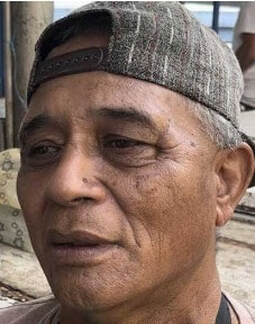
The Suva Fish Market Association has come out strongly today and stated that it does not agree with the dumping of the treated Fukushima nuclear wastewater into the Pacific Ocean, and they are also concerned that Prime Minister, Sitiveni Rabuka is saying that the discharged water is safe.
President of the Association, Samu Maraiwai says the 1.3 million tonnes of treated nuclear waste to be dumped into the Pacific Ocean poses a risk of massive destruction to our marine ecosystem and our source of livelihood.
Maraiwai says the waste will be toxic to a certain level and it will affect the marine ecosystem including fish, seaweeds, corals and other sources of our livelihoods.
The 68-year-old says it may not affect us now but in the next 40 years, our future generation will be massively affected. Source: FijiVillage News
President of the Association, Samu Maraiwai says the 1.3 million tonnes of treated nuclear waste to be dumped into the Pacific Ocean poses a risk of massive destruction to our marine ecosystem and our source of livelihood.
Maraiwai says the waste will be toxic to a certain level and it will affect the marine ecosystem including fish, seaweeds, corals and other sources of our livelihoods.
The 68-year-old says it may not affect us now but in the next 40 years, our future generation will be massively affected. Source: FijiVillage News




